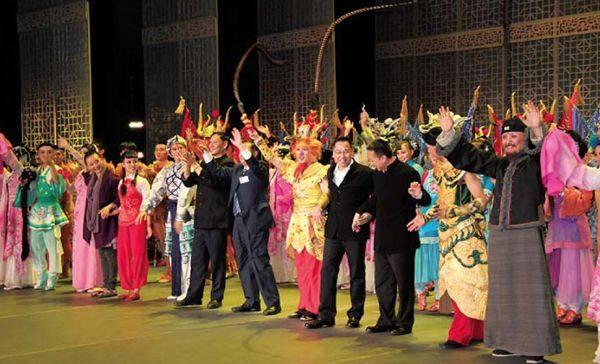对艺术的再艺术
2012-04-29叶勇期
叶勇期



20年前,当时还是温州歌舞团编导的邢时苗结识了盖叫天的嫡孙张善麟,看到了盖叫天口述自传《粉墨春秋》,大为震撼,从此与盖派艺术结下深厚感情。
20年后,已经成为国内首屈一指的舞台导演的邢时苗,带着他一手执导的歌舞剧《粉墨春秋》,于澳大利亚中国文化年之际,在全球著名的悉尼歌剧院亮相,开创了中国歌舞剧的先河,也让当地的老外和华人们见识了中国梨园春秋和盖派艺术的传奇。
三天四场的演出中,鲜花和赞誉如潮而来,但期间的一个细节却打动了我:一位名叫杨海鹰的凤凰台驻澳记者闲聊中谈起:出国之前,他曾经是浙江话剧团的演员—这一说,引开了大家的话匣子:编导邢时苗说,他是温州人,曾经在浙江歌舞剧团工作;戏曲导演张善麟说,爷爷盖叫天定居杭州后,他也算是杭州人了,是浙江京剧团的成员—大家恍然,原来,这次《粉墨春秋》的上演,还充满着浙江元素。
编导:融合浙江舞蹈的气质
《粉墨春秋》之前,邢时苗已经先后8次担纲中央电视台春节联欢晚会的舞蹈总监和现场导演,多次出任《同一首歌》《心连心》等大型晚会的策划、导演。他所创作的优秀作品成为中国舞蹈的典范之作,是近年来温州舞蹈界当之无愧的“才子”。其中最具影响力的当属获得“我最喜爱的春节晚会节目”歌舞类一等奖的《飞天》。舞蹈《飞天》是2008年央视春晚的一大亮点,舞者的一条腿始终固定在舞台上,只依靠身体和另一条腿来完成表演,既糅进了杂技艺术的惊险,又具有舞蹈语汇的唯美,构思十分巧妙,给广大观众留下了深刻印象。
然而,完成一部融合浙江气质的戏曲、舞蹈精华的舞剧精品,是这位温州杰出编导多年来的夙愿。
2003年,邢时苗请香港著名作家李碧华写剧本,李碧华破例为舞剧创作。一年半之后《武生》写成,这是其创作电影《霸王别姬》后,又一部聚焦梨园的剧作,也成为舞剧《粉墨春秋》的文学脚本。“把《霸王别姬》改编成舞剧,我的这个设想比陈凯歌拍电影要早好几年,可惜行动晚了。所以,这次请李碧华为《粉墨春秋》编剧要抢个先。”邢时苗说,“我自信这是一部优秀的作品,因为我借助了戏曲这座大山,也就是站在了巨人的肩膀上。”《粉墨春秋》将传统戏曲文化表现得淋漓尽致,这种对艺术的“再艺术”,是舞剧的一大亮点。
气势磅礴的髯口舞,椅背和戏台护栏上的高跷舞,如行云流水般的水袖舞,还有将京剧靠旗引申编创的靠旗舞……各式各样带着盖派风采的戏曲绝活被融入舞蹈,几次掀起表演高潮,也证明了浙江气质戏曲被澳洲观众所接受。
主演:源自浙江山水的孕育
《粉墨春秋》的主演黄豆豆是当今中国舞台艺术界最炙手可热的舞者,也是又一位来自浙江的主创。
黄豆豆是温州人,他的父亲和《粉墨春秋》的总导演邢时苗是好朋友。浙江温婉的山水孕育了黄豆豆从小酷爱跳舞的性格,通过不懈努力,黄豆豆终成大器。
邢时苗说:“我是看着豆豆一路成长的,早在1995年他担任央视春节联欢晚会导演时,当黄豆豆在角落的一张桌子上苦练《醉鼓》时,我就联想到了前不久在盖叫天大师嫡孙张善麟家里看到的盖叫天口述自传《粉墨春秋》。盖老年轻时跟豆豆一样,都是个子矮、先天条件不够好的演员,他们都是通过后天的不懈努力终于成材的典范。盖老是戏痴,豆豆是舞痴,他们这种视艺术如生命的执着激发了我的灵感。”
舞剧是舞蹈最高艺术形式,也是没有语言和国界限制的舞台艺术,再加以中华博大精深的戏曲,这个创意让当时年仅20岁的黄豆豆以及其他艺术家兴奋不已。但邢时苗按捺不动,他对黄豆豆说:“你现在太年轻,这部剧文化底蕴很深,你还不够格,过几年再说。”黄豆豆28岁那年又碰到邢时苗,就问:“我现在能演了吗?”邢时苗还是摇头:“一个真正的艺术家是要具备深厚的底蕴和阅历的,你阅历还不够,过几年再说。”于是,那一年,黄豆豆选择了申请奖学金去美国留学。一直到两年前再次碰到邢时苗,黄豆豆又问:“我现在能演了吗?”邢时苗回答:“现在可以了。”
邢时苗为此剧积蓄了16年,黄豆豆为此剧等待了16年,16年的等待成就了舞台上一个顶天立地的武生形象,也成就了这位浙江舞者的人生。黄豆豆说:我用这部剧完成一个演员向舞剧致敬、向国粹致敬的梦想!著名舞蹈评论家冯双白看了《粉墨春秋》后赞美道:“黄豆豆在该剧中塑造的艺术形象达到了他自己的巅峰状态,黄豆豆的艺术人生因此剧而完美!”
作为为期一年的“澳大利亚·中国文化年”闭幕式节目,《粉墨春秋》在澳洲大陆引起了巨大反响。澳大利亚总理茱莉亚·吉拉德说:“《粉墨春秋》登上悉尼歌剧院演出是中澳双方不平凡关系最恰当不过的注脚,彰显出澳大利亚和中国艺术的绝佳境界。所有的观众都会尽享因华美服饰和活力舞蹈而著称的这次演出。”
观看这次演出的文化部副部长赵少华也给予了《粉墨春秋》极高评价,她对该剧的主创人员说:“这次出演澳洲的大戏,国内有好多演出团体想来参加,但悉尼歌剧院歌剧厅观众的掌声告诉我们,《粉墨春秋》演出太精彩了,为中澳文化年的成功举办锦上添花,为中国增了光!”
当然,我还觉得,《粉墨春秋》不仅是中国与澳洲的成功文化交流,更是浙江气质在国际大舞台上的又一次成功呈现。□
(本文照片由张善麟提供)
Zhejiang Elements in Year of Chinese Culture in Australia
By Ye Yongqi
“Opera Warriors”, a dance drama based on the life of Gai Jiaotian and directed by Xing Shimiao, celebrated the closing of the Year of Chinese Culture in Australia. The dance drama was presented at the Opera Theater, Sydney Opera House with four shows from 14 to 16 June 2012.
The dance drama is a show of Zhejiang elements.
The story is based on the life story of Gai Jiaotian (born as Zhang Yingjie, 1888-1971, a Peking Opera master of national renown who spent his last decades in Hangzhou). Originally, “Opera Warriors” is the title of his biographical narrative. Xing Shimiao read the memoir and met Zhan Shanlin, a grandson of the master kongfu actor, 20 years ago. Then a burgeoning choreographer, Xing was amazed by the kongfu art of Gai Jiaotian. The idea of making a dance version of the narrative took roots in his heart. Recalling the originality of the idea, Xing notes that he got the idea a few years earlier than director Chen Kaige did. Chen directed Farewell My Concubine, a film based on the namesake Peking Opera Drama.
Xing is a native of Wenzhou, a port city in southern Zhejiang Province. He worked as a choreographer for Zhejiang Song and Dance Ensemble before moving to Beijing. He had jointly directed and supervised eight Spring Festival galas for CCTV before he choreographed Opera Warriors.
In 2003, Xing engaged Ms Pik Wah Li (Lilian Lee) to write a script for the dance drama he had wanted to do for a long while. Li was one of the coauthors who wrote the screenplay Farewell My Concubine that won the Golden Palm at the Cannes Film Festival in 1993.
With the script ready, the inspired choreographer introduced into the dance drama many of the kongfu moves highlighted by Gais Peking Opera art. Many moves are most applauded parts.
The lead dancer is Huang Doudou, one of the best dancers in China and another Wenzhou native that plays a big part in the success of this dance drama. Huangs father is a friend of Xing. Xing says that he is a witness to how Huang has matured and blossomed into a celebrated dancer. In the 1995 Spring Festival gala, Xing saw Huang rehearse on the top of a dinner table at the rehearsal hall. The hard-working young dancer reminded Xing of Gai Jiaotian in his youth. Like Gai Jiaotian, Huang is a man of short stature and with some physical imperfections. Both succeeded thanks to their commitment and hard work.
When Huang learned about Xings big idea for a dance drama, the young dancer could not hold himself. At that time, he was 20 and he wanted the lead role. Xing said he was too young. Eight years later, Huang asked Xing whether he was mature enough for the character. Xing asked him to wait another few years.
Huang, now 36, is mature for the character of a Peking Opera kongfu player. He says that by this role he pays respects to Gai Jiaotian, to dance drama, to traditional Chinese art. Feng Shuangbai, a noted dance critic, comments that Huang reaches a career high through this dance drama.
There are more Zhejiang elements in the dance drama. Zhang Shanlin, the grandson of Gai Jiaotian, acts as advisor to the drama. In Australia, he met with old friend Lu Zhongtang, a Zhejiang native who studied Peking Opera under the tutelage of Zhang Erpeng, the second son of Gai Jiaotian. Many audience members who watched the show in Sydney were from Zhejiang and had watched Gai Jiaotians performance before.
Opera Warriors caused a sensation in Australia, bringing the Year of Chinese Culture to highly memorable conclusion. □
